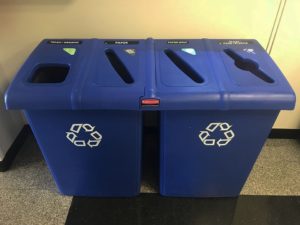
All over the school, Duquesne has clearly labeled recycling bins that allow students to separate their recyclable materials into the appropriate bins.
Katia Faroun | Photo Editor
10/11/2018
Known throughout the world as a treasured commodity, plastic is highly depended on by cultures and societies globally — so much so that the amount of plastic produced in one year is roughly the same as the weight of humanity, according to Science Advances.
In 2017, the Chinese government announced in its National Sword Policy that it will no longer accept plastic exports from recycling as of January 2018. The government cites local environmental issues as its main reason for the ban.
Up until this statement, China had accepted 106 million metric tons of plastic globally since 1992. From 1988 to 2016, it accepted 26.7 million metric tons of plastic from the U.S. alone. An estimated 111 million metric tons of plastic waste will be displaced by 2030 due to this ban, according to an article by NPR.
For American recyclers, this change is concerning.
In the U.S., residents have heavily relied on curbside recycling for the disposal of their plastic, glass, aluminum, paper and cardboard waste. Curbside recycling allows residents to combine all of their recyclable waste into a single bag that is collected by their local waste management company. The combination of all recyclable waste is known as single-stream recycling, or commingled recycling.
Americans have come to appreciate the convenience of single-stream recycling and how it makes them feel like they are helping the environment. However, many overlook the rules that they must follow in order to efficiently and correctly use single-stream recycling.
In order for single-stream recycling to work, residents must only recycle clean plastic, cardboard, glass, aluminum and paper. This excludes plastic lined with leftover food, greasy cardboard and sticky soda cans. They must also recycle only certain types of plastics, which vary depending on the region’s recycling standards. Each piece of plastic is labeled on the bottom with a certain number from one through seven that indicates what kind of plastic it is. Certain regions only recycle certain types of plastic.
Failure to abide by these rules results in contamination, which is when collected recycling contains non-recyclable materials. This includes trash, such as food waste and plastic wrapping, and recyclable materials that are rendered non-recyclable due to, for example, food residue. When collected recycling is contaminated, the products are no longer able to be recycled and are thrown away.
Because most Americans are not aware of the rules of recycling and the consequences of contamination, recycling has become less efficient for waste management facilities and more expensive for exporters.
Justin Stockdale, the co-executive director of the Pennsylvania Resources Council (PRC), elaborated on the issue of present-day recycling.
“The average American consumer has been told that many, many things are recyclable when, in fact, they’re not. And that’s a hard thing to come back from,” Stockdale said.
“We in this country have accepted a whole variety of plastics for recycling that have never actually been recyclable,” he said, “and China saying they will no longer import those plastics forces us to recognize that reality.”
China’s plastic import ban serves as a wake-up call for American recyclers to realize how important correct recycling is. It also brings light to the problem of American plastic consumerism, according to Hannah Enderby, member of the executive leadership team of Duquesne University’s Evergreen Club.
“It kind of teaches America a lesson that we do really need to just cut down on buying plastics and just being such a disposable society,” Enderby said.
Already, local recycling companies across the country are changing their collection rules to accept limited types of plastics, with some even not accepting glass as recyclable material.
Regions outside of Pittsburgh have adapted to these changes as well. Erie, Pennsylvania will no longer recycle glass, plastics numbered three through seven and shredded paper. In the South Hills, Republic Services will no longer accept glass and plastics numbered three through seven.
As of now, the city of Pittsburgh is still “marketing all of these materials as recyclables,” according to Stockdale. However, there will most likely be changes coming in the near future.
In order to prevent heavier consequences of contaminated recycling, Pittsburgh residents need to be more mindful of their recycling habits. People can recycle more efficiently by cleaning recyclables before throwing them into recycling bins in order to prevent food residue contamination.
Residents can also take advantage of using sorted recycling bins, which help prevent contamination by inhibiting people from placing a recyclable in the wrong receptacle. Finally, Pittsburgh residents can continue to educate themselves and others on local recycling protocols to further promote recycling and its importance.
“Recycling is not dead. Recycling is not broken,” said Stockdale. “Recycling is having a little bit of an honest correction.”

